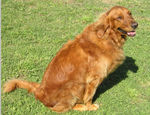The Golden Retriever
common training and behavior problems
Happy-go-lucky and active, Goldens need lots of playful excercise with their owners to maintain their physical and mental health. Golden Retriever owners call us with a variety of issues, the most common are:
- Stealing food
- Mouthing
- Chewing
- Hiding objects
- Jumping up on people
- Digging
- Roaming
- Excessive attention seeking
- Agressive behavior
- General obedience
- Find out more about our dog training services or call 203.232.8018 for a happy more enjoyable relationship.
Whatever your needs, together we can design a dog training program that is just right for you and your dog.
![]()
From Wikipedia, the free encyclopedia
 The Golden Retriever is a relatively modern and very popular breed of dog. It was developed as a retrieving dog to use while hunting wild fowl. Today it is one of the most common family dogs as it is easy to handle, very tolerant and does not require very much of the owners, other than regular exercise, food and veterinary check-ups. It is often affectionately known as a Golden or "Yellow Retriever". Golden Retrievers are observed to to be highly compatible with people and other dogs, though after the seclusion from dog life it may develop human qualities and then may not be fond of other dogs. It will bark when startled but other than that it makes a poor watchdog due to its friendly nature. Golden Retrievers are particularly valued for their high level of sociability towards people.
The Golden Retriever is a relatively modern and very popular breed of dog. It was developed as a retrieving dog to use while hunting wild fowl. Today it is one of the most common family dogs as it is easy to handle, very tolerant and does not require very much of the owners, other than regular exercise, food and veterinary check-ups. It is often affectionately known as a Golden or "Yellow Retriever". Golden Retrievers are observed to to be highly compatible with people and other dogs, though after the seclusion from dog life it may develop human qualities and then may not be fond of other dogs. It will bark when startled but other than that it makes a poor watchdog due to its friendly nature. Golden Retrievers are particularly valued for their high level of sociability towards people.
Appearance
Golden Retrievers reach their full height around one year of age and full weight around age two, though many owners comment that their dogs retain their puppyish nature for life. This is a large breed very similar in appearance to the yellow Labrador Retriever, especially when young. The most obvious difference is the Golden Retriever's luxuriant coat.
Temperament and activities
Goldens are active and fun-loving but also exceptionally patient, as befits a dog bred to sit quietly for hours in a hunting blind. Other characteristics related to their hunting heritage are a size suited for scrambling in and out of boats and an inordinate love for cool water.
They are noted for their affection for people, and their tolerance of children. They are natural clowns, which characterizes them as great dogs to use in hospitals or retirement homes. Golden Retrievers make great pets for young children due to their nurturing instincts and gentle nature. The other side of this is that they require lots of companionship to be happy. They do well in obedience trials and make excellent guide dogs; however, like people, not all of these dogs are this way. While they might not do quite as well in field trials as Labrador Retrievers, they are excellent hunters that are famous for their outstanding scenting abilities. They are exceptionally eager to please their owners.
The Golden Retriever loves to retrieve. Retrieving a thrown stick, tennis ball, or frisbee can keep a Golden occupied and entertained for hours, particularly if there is also water involved.
Today's Golden Retrievers fall into two groups: show dogs and field dogs. The Goldens in the show group are generally bigger boned, longer, and heavier. The champagne color and long flowing coat are highly prized in the show ring. On the other hand, field Goldens tend to be smaller, longer legged, and be redder golden. These two strains derive from famous goldens from the 1960s. Gold Rush Charlie moved the show Goldens toward their present characteristics, while Holway Barty greatly affected the field group. Presently, many breeders are attempting to unite these two strains into the all-Purpose Golden Retriever.
Wikipedia contributors, "Golden Retriever," Wikipedia, The Free Encyclopedia, http://en.wikipedia.org/w/index.php?title=Golden_Retriever&oldid=51489657 (accessed May 5, 2006).
Breed Specific Behavior
We encourage the potential dog owner to fully investigate individual breed and bloodline characteristics before acquiring a new dog. We will continue to add to and update this section over time.

